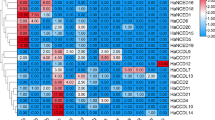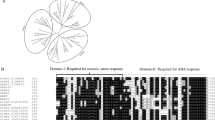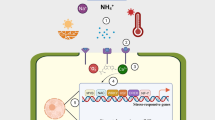Abstract
Salinity is a major abiotic stress that negatively affect plant growth, survival and productivity. In the present study we have identified six putative salt inducible Arabidopsis ortholog genes from chickpea genome belonging to different functional categories as per gene ontology classification. Salt responsive expression of genes was validated by semiquantitative RT-PCR which revealed their possible role in salt stress response. Comparison of promoter regions of these six genes of chickpea with promoter region of 44 putative salt responsive genes of Arabidopsis revealed three conserved motifs of different lengths specific to chickpea genes. The genes identified in this study may serve as promising candidates in studies of salt tolerance mechanisms of chickpea.


Similar content being viewed by others
References
Agarwal, P. K., Shukla, P. S., Gupta, K., & Jha, B. (2013). Bioengineering for salinity tolerance in plants: state of the art. Molecular Biotechnology, 54, 102–123.
Ali, Z., Zhang, D. Y., Xu, Z. L., Xu, L., Yi, J. X., & He X. L., et al. (2012). Uncovering the salt response of Soybean by unraveling its wild and cultivated functional genomes using tag sequencing. PLoS ONE, 7(11), e48819. doi:10.1371/journal.pone.0048819.
Ashraf, M., & Harris, P. J. C. (2004). Potential biochemical indicators of salinity tolerance in plants. Plant Science, 166, 3–16.
Bailey, T. L., Williams, N., Misleh, C., & Li, W. W. (2006). MEME: discovering and analyzing DNA and protein sequence motifs. Nucleic Acids Research, 34, W369–W373. (Web Server issue).
Fabian, A., Buske, M. B., Denis, C. B., & Timothy, L. B. (2010). Assigning roles to DNA regulatory motifs using comparative genomics. Bioinformatics, 26(7), 860–866.
Garg, R., Shankar, R., Thakkar, B., Kudappa, B., Krishnamurthy, L., Mantri, N., et al. (2016). Transcriptome analyses reveal genotype- and developmental stagespecific molecular responses to drought and salinity stresses in chickpea. Scientific Reports, 6, 19228. doi:10.1038/srep19228.
Jiang, Y., & Deyholos, M. K. (2006). Comprehensive transcriptional profiling of NaCl-stressed Arabidopsis roots reveals novel classes of responsive genes. BMC Plant Biology, 6, 25.
Long, W., Zou, X., & Zhang, X. (2015). Transcriptome analysis of Canola (Brassica napus) under Salt Stress at the Germination Stage. PLoS One, 10(2), e0116217. doi:10.1371/journal.pone.0116217.
Maa, Y., Qina, F., & Tran, L. P. (2012). Research Highlight Contribution of Genomics to Gene Discovery in Plant Abiotic Stress Responses. Molecular Plant, 5, 1176–1178.
Marone, M., Mozzetti, S., De Ritis, D., Pierelli, L., & Scambia, G. (2001). Semiquantitative RT-PCR analysis to assess the expression levels of multiple transcripts from the same sample. Biol Proced Online, 3, 19–25.
Molina, C., Zaman-Allah, M., Khan, F., Fatnassi, N., Horres, R., Rotter, B., et al. (2011). The salt-responsive transcriptome of chickpea roots and nodules via deep SuperSAGE. BMC Plant Biology, 11, 31.
Nimmy, M. S., Kumar, V., Singh, A. K., Jain, P. K., & Srinivasan, R. (2015). Expression analysis of a MATE-type transporter gene of Arabidopsis and its orthologues in rice and chickpea under salt stress. Indian Journal of Genetics and plant breeding, 75(4), 478–485. doi:10.5958/0975-6906.2015.00076.0.
Seki, M., Narusaka, M., & Ishida, J. (2002). Monitoring the expression profiles of 7000 Arabidopsis genes under drought, cold and high salinity stresses using a full-length cDNA microarray. Plant Journal, 31, 279–292.
Shinozaki, K., Yamaguchi-Shinozaki, K., & Seki, M. (2003). Regulatory network of gene expression in the drought and cold stress responses. Current Opinion in Plant Biology, 6, 410–417.
Xian, L., Sun, P., Hu, S., Wu, J., & Liu, J. H. (2014). Molecular cloning and characterization of CrNCED1, a gene encoding 9-cis-epoxycarotenoid dioxygenase in Citrus reshni with functions in tolerance to multiple abiotic stresses. Planta, 239, 61–77.
Acknowledgments
N. M. S. thanks CSIR and ICAR and V. K thanks the University Grants Commission for the UGC Research Fellowship.
Author information
Authors and Affiliations
Corresponding author
Rights and permissions
About this article
Cite this article
Nimmy, M.S., Kumar, V. Identification and expression analysis of six salt inducible Arabidopsis ortholog genes in chickpea. Ind J Plant Physiol. 21, 362–365 (2016). https://doi.org/10.1007/s40502-016-0231-6
Received:
Accepted:
Published:
Issue Date:
DOI: https://doi.org/10.1007/s40502-016-0231-6




